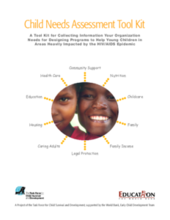Many developing countries are hard hit by the HIV/AIDS pandemic, particularly in Africa. India and other Asian countries are also being affected. In some areas, as many as one in every 3 women of childbearing age are infected with HIV and will succumb to AIDS, probably before their children reach adulthood. The US Census Bureau has estimated that 15.6 million children had lost their mother or both parents to AIDS by the end of 2000. More than 90% of these children are from sub-Saharan Africa.
Because so many young people are dying, the social framework that has been used for generations to care for widows, widowers, and young children is heavily stressed, and the needs of many young children and their families are not being met. Young children, especially those under 5 years of age, are particularly vulnerable to the effects of inadequate care during these early years. Poor health, malnutrition, little stimulation resulting from inadequate care can all affect the child’s ability to think, learn, and function effectively. These effects are likely to have long-term consequences that are irreversible.
In response to this devastating problem, the Early Child Development Section of the World Bank has commissioned the development of this assessment tool for use by World Bank Task Managers, NGO service organizations and others in designing programs to assist in meeting some of these needs.
This tool kit was developed by The Task Force for Child Survival and Development to assist organizations in assessing the needs of children in areas heavily impacted by the HIV/AIDS epidemic. It is essentially a detailed guide for conducting cluster surveys of households with young children and producing information on individual as well as community needs. The survey instrument, definitions, script for the interviewer, and training materials are included in the package. The software that accompanies this package includes a program for analysis and generation of reports.
The assessment is designed to provide information about the household, family, the main caregiver of young children, each child under 8 years of age, their basic needs (housing, food, clothes, bedding, daily activities, health, education and childcare), and unmet needs. The information from the assessment is intended to be used to design service programs, targeted to the needs of these young children and their families. Although designed for high AIDS prevalence areas, the survey questionnaire is quite general and could be easily modified for use in other settings where children are orphaned and/or vulnerable.
The CNA Tool Kit will be revised as information from the field testing is analyzed. Updated versions can be obtained from the website: www.taskforce.org.
©The World Bank

